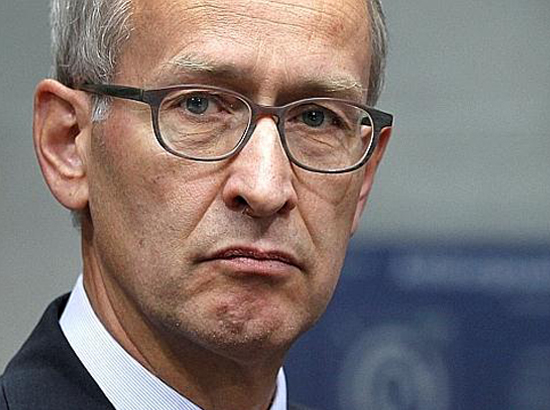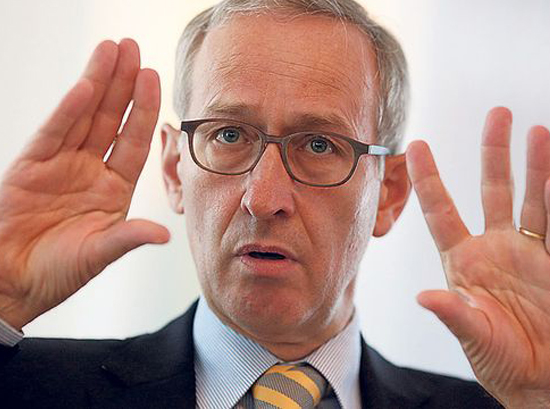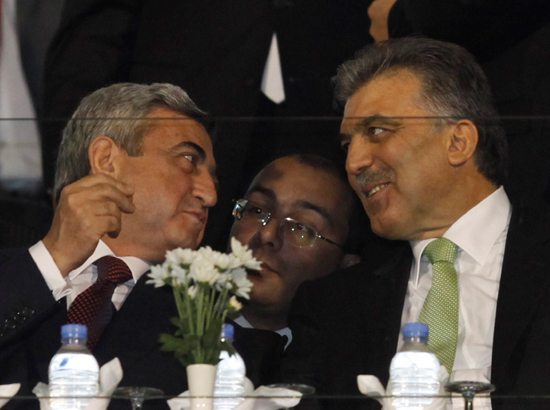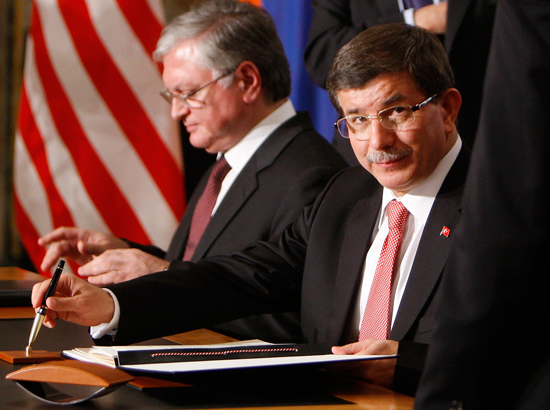Mediamax launches a new special project today - “Special File”. It will present unknown or less known details of the Armenian foreign policy.
It is widely known that Switzerland was the main mediator of Armenian-Turkish process launched in 2008. However, only a few people know that the foundation for Turkish leader Abdullah Gül’s visit on January 6, 2008, and the launch of the “football diplomacy” was laid long before Serzh Sargsyan's official invitation. The secret talks held between Armenian and Turkish diplomats through the mediation of the Swiss side were launched back in September 2007. One of the direct participants of the process, former Swiss diplomat Michael Ambuhl, told Mediamax about the origins of the “football diplomacy”, about how Switzerland assumed the role of a mediator, the environment of the secret talks and the works on the bilateral protocols.
Swiss diplomat Michael Ambuhl, who was the State Secretary for Foreign Affairs in 2005-2010, is one of the architects of Armenia-Turkey secret negotiations launched in September, 2007. With his direct participation, trilateral meetings were held among the Deputy FMs of Armenia and Turkey, Arman Kirakosyan and Ertugrul Apakan, respectively in 2008.
Michael Ambuhl was also directly involved in the elaboration of Armenian-Turkish Protocols and attended the Protocol signing ceremony in October 2009. Highlighting the importance of Ambuhl’s contribution to the negotiation process, Daniel Fried, who was the US Assistant Secretary at the time, admitted that “Ambuhl conducted the trilateral work and deserves enormous credit. We didn’t do anything without him”.
- Only a few people know that you were one of the architects of secret negotiations between Armenian and Turkish diplomats launched in September, 2007. The mentioned process is known to be the climax of the signing of Protocols in October, 2009. Could you explain it happened that Switzerland became the main mediator of the process, and you virtually became its ideological inspirer?
- The short answer to your first question is: Because Armenia and Turkey invited Switzerland to become the mediator. In the longer answer I would add that Switzerland, as a neutral country, a non-EU-, nor NATO-state, as a small country with no historical links to the Caucasus-region and no hidden agenda, had good preconditions to take over such a mandate. I became the mediator because I was the Political Director of the Swiss Foreign Ministry and my Minister wanted me to take it on and of course because it was a very challenging task.
- In his monograph dedicated to Armenian-Turkish Protocols, American expert David L. Phillips writes that no special instructions were given to you and that there was just the clear goal to achieve success. What were you guided by upon embarking on the mediation work and what was your main goal in 2007?
- The main objective was helping to contribute to the mutual understanding between Armenia and Turkey. One of my priorities was to gain the confidence of the two sides by adhering to strict neutrality and playing the role of an honest broker. In this function, you have to seek to understand the positions of both parties and then try to make sensible proposals acceptable to both of them. It is clear that such a process needs time.
DOSSIER
Passages from David L.Phillips monograph “Diplomatic history: The Turkey-Armenia Protocols”
The Swiss initiative to revitalize contacts between Turkish and Armenian officials was launched on September 16, 2007, when the Turkish and Armenian foreign ministers had an initial exchange on the margins of the UNGA about Switzerland’s involvement. Michael Ambuhl, a highly regarded diplomat and negotiator who was serving as State Secretary and Head of the Directorate of Political Affairs in Switzerland’s Federal Department for Foreign Affairs, was the point man. He had no history of involvement on Turkish-Armenian issues and no family ties to either side.
… Ambuhl approached Calmy-Rey, who agreed that Bern should get involved; Ambuhl was assigned to the file. He was not given any specific guidance. Bern “only wanted a success.” He was told to “bring (Turks and Armenians) together and do something good. You’re just not allowed to spoil it.”
A proposal from the Swiss government to assist the creation of a commission of historians to jointly and scientifically examine the shared history of Turkey and Armenia was conveyed to Turkish officials by the Swiss ambassador in Ankara during the summer of 2007. Ambuhl met Oskanian in Yerevan at the end of September to discuss an initiative on the normalization of relations, including the settlement of differences regarding the historical past. Oskanian suggested that the normalization of bilateral relations between Turkey and Armenia should run parallel to activities of a historical commission. Ankara agreed to broaden the scope of talks to include opening and mutual recognition of the borders, as well as the establishment of diplomatic relations, if Yerevan agreed to the joint historical commission.
Turkish officials focused on preliminary ideas for the establishment of a joint history commission, insisting that the border could only be opened when the commission had been established and had started its work. After Ambuhl attended Sarkisian’s inaugural, he presented both sides with a revised Dialogue Turkey-Armenia paper and invited Apakan and Kirakossian for their first trilateral meeting on May 21, 2008.
Michael Ambuhl.
Photo: Nzz.ch.
Ambuhl explains, “It was an internal meeting. I tried to determine sensitivities,” and emphasizes, “I cultivated neutrality.” Kirakossian rejected a stand-alone history commission modeled earlier on the Bergier Commission (by the proposal of Swiss Ambassador to Turkey). Ambuhl suggested a commission focused on all bilateral issues: “How do we go about this? Is recognition necessary? In our discussions, we came closer to the real question: How is the bilateral aspect done? Do we first need diplomatic relations? How do we develop diplomatic relations?”
The second meeting in Gertzenzee occurred in July 2008. The parties agreed that their work would focus on the establishment of diplomatic relations, normalization, mutual recognition, and opening the border, and creation of a trilateral commission of experts dealing with the historical dimension.
Ankara entered into the process and was prepared to go along with the first two items, as long as the third item was realized. The historical commission was of primary importance to Ankara. Turkish officials sent Ambuhl a paper entitled “Elements of a Tripartite Commission of Experts and Historians” on July 23. Three days later, Swiss officials finalized their proposal for the tripartite commission and presented it to both sides.
Personal relations were established between Ambuhl, Kirakossian, and Apakan, whom Ambuhl affectionately calls “Kira” and “Apa.” Kirakossian and Apakan also got to know one another. They are both highly competent, professional diplomats. They are also very much alike in temperament. Ambuhl notes, “They both are not so different. They even look like they could be brothers.” He recalls, “We all got along quite well.”
Meetings moved from confidence-building to substance, addressing the delicate question of sequencing: who does what first? “Slowly, slowly, we prepared the text,” Ambuhl explains. “The text was always drafted by us, the Swiss.” The third meeting at Gertzenzee was held on September 15. Three Protocols became two, with the Protocol on the historical commission integrated into the Protocol on the Development of Relations. The Protocols were refined during ministerial and working-level trilateral meetings in New York (September 22–24, 2008), Gertzenzee (October 25, 2008), Bern (January 21, 2009), Davos (January 27, 2009), and on the margins of the Munich Security Conference (February 7, 2009).
U.S. officials were not informed. Switzerland cultivates its independence, which is why it is not a member of the EU. Washington was kept in the dark, until a chance meeting between Apakan and Assistant Secretary of State for European and Eurasian Affairs Daniel P. Fried in the Lufthansa business lounge at the Munich airport in December 2007. Apakan told Fried about the Swiss facilitation. Fried told Secretary of State Condoleezza Rice, who told National Security Adviser Stephen Hadley, but no other U.S. official was informed at the time.
Matthew J. Bryza was Rice’s point man for the Caucasus. Bryza had worked closely with Rice in the White House when he served on the National Security Council as Director for Europe and Eurasia. Bryza also served as the U.S. Representative to the Minsk Group. Bryza was not told about the Swiss mediation but, as a smart diplomat, figured out what was going on. Bryza insisted, “We are not mediators of Armenia’s relations with Turkey.” Congressional support for genocide recognition, the president’s annual statement on Remembrance Day, and upcoming presidential elections made it difficult for the United States to play a mediation role. 
Armenian and Turkish Presidents in Yerevan in 2008.
Photo: REUTERS.
- In May 2008, the first trilateral meeting among Arman Kirakosyan (Zohrab Mnatsakanyan and Karen Mirzoyan representing the Armenian side also participated in the meeting, - red.) and Ertugrul Apakan was held at Gerzense Castle nearby Bern. In what atmosphere did the meeting take place and what was on the agenda?
- I think both sides came to the meeting with the intention to explain their positions and to listen to the other side. The first encounter is always crucial. Understandably, in the beginning the atmosphere was tense, but during the meeting it became more constructive and at the end both delegations were ready to continue the discussions in further meetings. I believe, we - my two homologues and myself – developed a good working relationship throughout the process.
- Is it true that the preliminary text of both Armenian-Turkish Protocols was agreed upon at exactly the same time that your trilateral meetings took place in May, July and September 2008?
- The draft texts were established on the basis of the different trilateral meetings and of additional separate inputs from each side, which were transmitted to the other side for discussion.
- You not only attended the Protocol signing ceremony, but also held negotiations with Armenian Minister Edward Nalbandyan together with US State Secretary Hillary Clinton in the hotel at the moment the three-hour delay occurred. Can you unveil the details today related to what remained behind the scenes and how eventually the parties reached a compromise?
- As it is often the case, at the very end of a difficult diplomatic process there is a moment of suspense. You will understand that I cannot disclose any details of our negotiations, except that my impression was that everyone was committed to act according to his mandate and in good faith. 
Signing of Turkish-Armenian Protocols in Zurich in 2009.
Photo: REUTERS.
- Even though the Protocols were signed, they were not ratified and implemented. As a person who was directly involved in the work on them, do you believe they can again become relevant for Armenia and Turkey?
- It would not be normal if I would not be happy to see the protocols ratified. They would become relevant the moment both sides decide to ratify them. However, it is not up to me to make any speculative guesses about the “if” and the “when”.
- Armenians will celebrate the 100th anniversary of the Armenian Genocide in 2015. Do you see any possibility of development on this date?
- Maybe this is the opportunity for establishing good neighborly relations which is also one of the declared objectives of the protocols, signed in 2009 by the Armenian and Turkish Governments in Zurich, Switzerland. The decision of the coming into effect of these protocols is in the hands of the competent Armenian and Turkish Authorities.
Aram Araratyan talked to Michael Ambuhl.




















